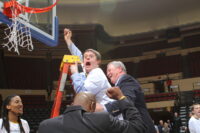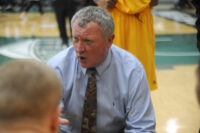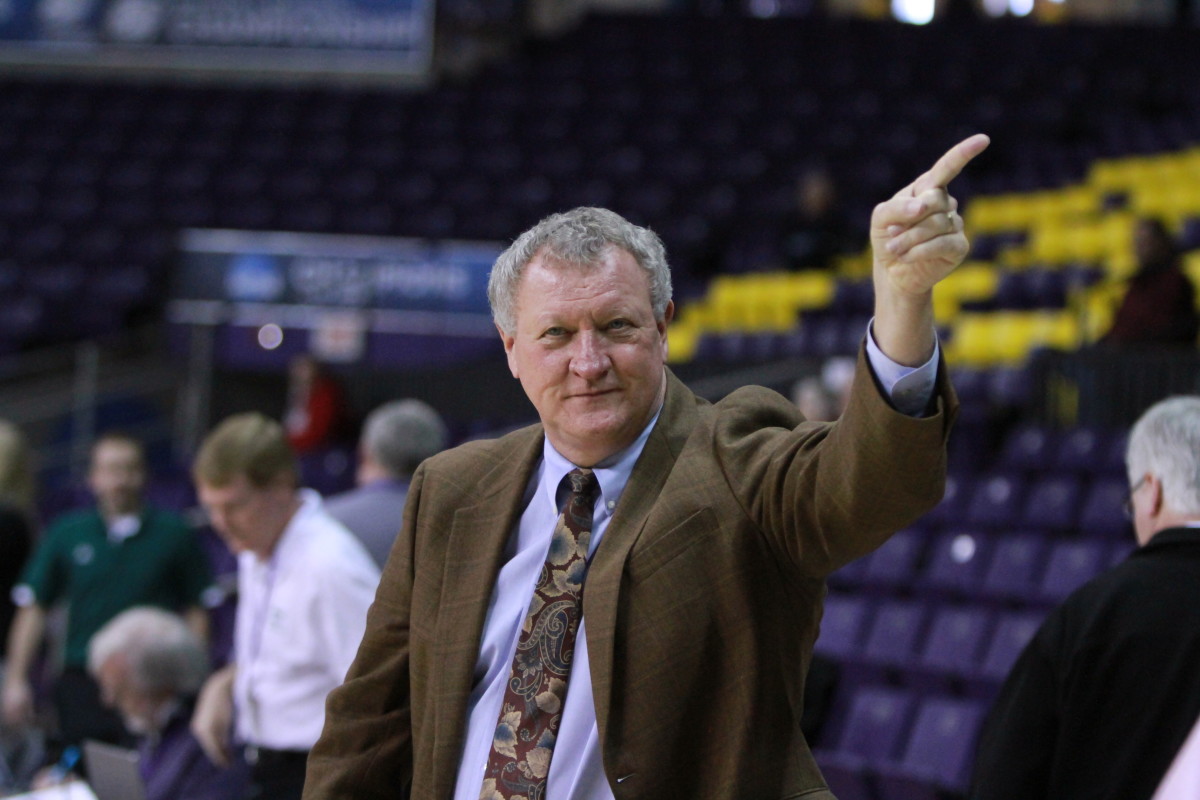Inductees
Robert Corn

Longtime basketball coach Robert Corn puts it this way: “Sometimes in this business, you have to be lucky.” A case in point is the day his coaching career took its most important step, with a phone call.
“I was in my office at Mountain Grove High School and it was coach (Gene) Bartow. He said, ‘Did you get my message I left you?’” Corn said, referring to the then coach of Alabama-Birmingham, whose initial message hadn’t been delivered. “Well, he offered me a graduate assistant job. If he hadn’t made that extra phone call that next day, I probably wouldn’t have gotten into college coaching.”
Corn went on to assist Bartow for 10 seasons and parlayed the experience into his first collegiate head coaching job at his alma mater, Missouri Southern, where he stayed 25 seasons and enjoyed enormous success. Now his path leads to the Missouri Sports Hall of Fame, which is proud to induct Corn among its Class of 2016.
Corn became the winningest coach in school history (413-305) before retiring in 2014, and has the third-most wins among coaches in the history of the Mid-America Intercollegiate Athletics Association, one of the top leagues in NCAA Division II.
He guided the Lions to 16 consecutive trips to the MIAA Tournament, 21 overall, and in 2014 earned his fourth MIAA Coach of the Year award. That award followed his ninth 20-win season.
Corn led five teams to the NCAA Division II Tournament, and one of his best seasons was 1999-2000, when the Lions reached the national semifinals and finished 30-3. That team cut down the nets three times – after the MIAA regular-season championship, the MIAA Tournament championship and the NCAA Division II South Central Regional Tournament title.
Not that he envisioned staying a quarter of a century. When hired in 1989, he was tasked to turn around a program that was 9-44 in the two prior seasons.
“I don’t think anytime you take a job you expect to stay in one place 25 years,” said Corn, whose success led Missouri Southern to name the Leggett & Platt Athletic Center’s floor the Robert Corn Court. “It just kind of worked out that way. You hope you adjust and do some things. But if you’re not successful, time is going to run out.”
Corn has been around basketball since his youth in Benton, Ill., and was a seventh-grader when he sensed coaching was his future. His path included All-State selection as a junior and senior, and Bartow recruited him to then-Memphis State University.
However, Corn transferred after two seasons. Looking for a new school, he found Missouri Southern in Joplin by accident after his former high school coach mentioned Missouri Southern was recruiting a couple of Benton players.
Corn ended up on one of Missouri Southern’s more memorable teams. The Lions finished 27-9 during his senior year of 1978, when they upset then-No. 1 Drury University in districts and reached the NAIA Tournament quarterfinals.
From there, Corn landed his first coaching job at Mountain Grove before moving on to Alabama-Birmingham, which reached the NCAA Tournament’s Elite Eight in 1981 before losing to Final Four-bound Louisville. Corn spent the final six years as Bartow’s top assistant, helping recruit and craft game plans that beat Ralph Sampson-led Virginia and Sam Bowie-led Kentucky. They nearly beat Isaiah Thomas and Indiana in a Sweet 16.
After 10 seasons, he knew it was time to find his own collegiate program, and it turned out Missouri Southern was seeking a men’s basketball coach.
What a success it was. In 1993, the Lions won 21 games and reached their first NCAA D-II Tournament. He still keeps up with Kenny Simpson, Ron Joyner, Demarco McCullough and Keith Allen.
Seven years later, the Lions lost, 75-74, to eventual champion Metro State in the national semifinals. That was after an official whistled Carlos Escalera for a foul with 1.5 seconds left – and he was 75 feet away from the basket. “To this day, I’ve never watched that tape,” Corn said. “And I never will.”
Still, that season showed Corn’s recruiting savvy. He brought in three Puerto Ricans in Escalera and Osiris Ricardo, the team’s top two scorers, and Eddin Santiago. In the mid-2000s, Corn also changed defensive schemes with more running and trapping and, in 2014, incorporated ball screens into the offense.
“We tried to adjust to our players’ talent,” Corn said. “You can’t be stubborn in this business. And I always felt like I tried to bring in assistant coaches with new ideas.” Assistants on the 1999-2000 team were future Division I coaches Chris Lowery and Paul Lusk.
“All of this success is not because of me,” Corn said. “I’ve just been fortunate to be around a lot of great people. There’s no doubt about it.”



